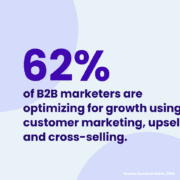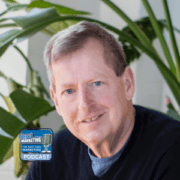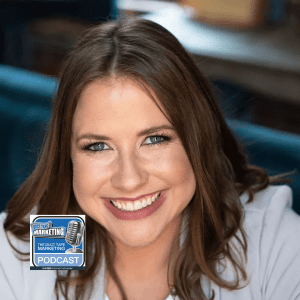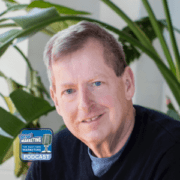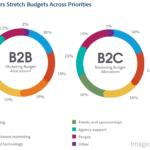Why Email Marketing Is (Still) Important In 2022
Why Email Marketing Is (Still) Important In 2022 written by John Jantsch read more at Duct Tape Marketing
Marketing Podcast with Laura Goldberg
 In this episode of the Duct Tape Marketing Podcast, I interview Laura Goldberg. Laura is the Chief Marketing Officer at Constant Contact. Before Constant Contact, she served as a Chief Revenue Officer for Cabbage, a leading cash flow management and data platform for small businesses acquired by American Express. Prior to that, she was the Chief Marketing Officer at Legal Zoom. Laura has held leadership roles in product and operations with leading e-commerce companies, such as the NFL and Napster.
In this episode of the Duct Tape Marketing Podcast, I interview Laura Goldberg. Laura is the Chief Marketing Officer at Constant Contact. Before Constant Contact, she served as a Chief Revenue Officer for Cabbage, a leading cash flow management and data platform for small businesses acquired by American Express. Prior to that, she was the Chief Marketing Officer at Legal Zoom. Laura has held leadership roles in product and operations with leading e-commerce companies, such as the NFL and Napster.
Key Takeaway:
Email marketing is still as relevant as ever. But as marketing evolves, your approach to it needs to, too. In this episode, I talk with the CMO of Constant Contact, Laura Goldberg, about the state of email marketing, what effect channels like SMS are having, and how to utilize email effectively today to build trust across the generations who use it.
![]()
![]()
Questions I ask Laura Goldberg:
- [1:36] How has the role of the CMO evolved?
- [3:41] What would you say to a room full of peers that the missed opportunities in marketing are – especially in the Chief Marketing Officer role?
- [5:08] What is the state of email marketing in the overall mix today?
- [7:36] How is SMS as a preferred behavior channel now impacting your thinking as an email channel?
- [9:10] How is AI going to impact what you’re doing at Constant Contact?
- [10:48] Is having more of a learning technology built into email currently on the Constant Contact roadmap?
- [13:51] What are some of the effective ways that you’ve seen people merging digital and non-digital?
- [16:30] How do use email to actually build trust?
- [18:19] Have you noticed a generational difference in terms of what people want from email?
- [20:08] What should we be doing as email marketers for the holidays?
- [21:33] Is there somewhere you’d like to invite people to connect with you?
More About Laura Goldberg:
- Connect with Laura on LinkedIn
- ConstantContact.com
Take The Marketing Assessment:
Like this show? Click on over and give us a review on iTunes, please!
John Jantsch (00:00): This episode of the Duct Tape Marketing Podcast is brought to you by Marketing Against the Grain, hosted by Kip Bodner and Keion Flanigan is brought to you by the HubSpot Podcast Network, the audio destination for business professionals. Look, if you wanna know what’s happening now in marketing, what’s ahead and how you can stay ahead of the game, this is the podcast for you host and HubSpot’s, CMO and SVP of Marketing. Kip and Keion share their marketing expertise unfiltered in the details, the truth, and nobody tells it. In fact, a recent episode, they titled Half Baked Marketing Ideas They Got Down In the Weeds, talked about some outside of the box campaigns with real businesses. Listen to marketing, its grain wherever you get your podcast.
(00:55): Hello and welcome to another episode of the Duct Tape Marketing Podcast. This is John Jantsch. My guest today is Laura Goldberg. She’s the chief marketing officer at Constant Contact. Before Constant Contact, she served as the chief revenue officer for Cabbage, a leading cash flow management and data platform for small businesses acquired by American Express. Prior to that, she was the chief marketing officer at Legal Zoom and has held leadership roles in product and operations with leading e-commerce companies such as the NFL and Napster. So long line of marketing officer jobs. Welcome to the show Laura.
Laura Goldberg (01:34): Thank you for having me.
John Jantsch (01:36): So let’s start there. With CMO role in the span of your career as a cmo, how how’s that role evolved? I have a lot of leadership folks in marketing and I always like to ask when I get that chance for you. That role evolved.
Laura Goldberg (01:50): It’s evolved a lot and in fact I don’t have any of the cred of of building my way up through marketing. I build, my early career was in finance and product and sort of operations slash general management. And it’s funny, when I was offered my first marketing role, I was like, I’m not a marketer, why do you wanna hire me? And the answer was, we need someone who thinks about the customer and someone who is numbers oriented. And so specifically on your question, I think the role has evolved certainly as internet marketing has evolved, as e-commerce has evolved to having to balance both what we think of as traditional marketing brand and image and what do we look like and what messaging are we conveying. But coupled with how are we doing, what’s the ROI on our spend, how are we using media dollars, email, text, the messaging in our product to acquire, engage, and retain our customers. And so 20 years ago, no one would’ve hired me as a cmo. But now as what’s expected has changed and maybe shifted it a bit, it’s perfect role.
John Jantsch (03:14): Well what’s so funny, I mean I’m talking to chief marketing officers now that roles that we’re traditionally in HR are falling under them. The employer branding and even diversity plays. I, I think the role is and just the fact that you spent time as a chief revenue officer. I mean there are a lot of organizations that think maybe marketing ought go there. So if you were sitting in front of a room of peers, what would you tell them that you think the missed opportunities are in the marketing, especially in the chief marketing officer role?
Laura Goldberg (03:48): I think marketers sometimes sell themselves short in terms of strategy and analytics. And it all depends on the story you wanna hear. There are sometimes the less interesting stories. But I think marketing, particularly in commerce led companies, it very much depends on the company has a role that is strategic across functions and is really driving through revenue and top line, the p and l, it’s usually marketing is driving the revenue, it’s generally the bulk of the non-human costs, right of it and pretty large portion other in my world other than tech and maybe support of the human costs. And so I think there’s an opportunity for marketers to sort of step into that broader voice, if you will, of the strategic direction of whatever company they’re in.
John Jantsch (04:55): So we’re in agreement that every department should report to marketing then
Laura Goldberg (04:58): Definitely not
John Jantsch (05:00):
Laura Goldberg (05:16): I think you’re right. It’s sophisticated, middle aged. I don’t know how we’d say that, but it is, I mean always tried and true when we survey customers, we just did in our small business now survey, when we ask people how they wanna hear from the small businesses that they do business with, they say email right Over half of ’em say email. And I think it’s comfortable if it’s from someone, someone you’ve opted into or a company you’ve opted into, it’s there. You open it, you look at it, right? Open rates are high, ROIs are high now it is low dollar to get into. I also think we think of email marketing as the silo thing. I send you an email with a coupon in it and you either click on it and transact or not, but it’s kind of the gateway to lots of things.
(06:17): So I may send you a happy birthday email just because I may use email as a way to get you to sign up for event that I’m having. And then you go to the event and your affinity for my company or my product increases, we use email to confirm that you’ve signed up for a list. I think we think of it as, oh, email marketing, I offer you something and you respond or you don’t. But it is this much broader communication channel that I kind of view as the center point of everything you’re doing. Now you may also do advertising or SMS or other kinds of marketing, but it’s really this key part and it’s such a, I don’t wanna say easy nothing. It’s relatively has that relatively easy and low risk to get started.
John Jantsch (07:14): Since you mentioned sms, I kinda wanna throw that in there because I’m seeing a lot of people moving. For me example, I’m, I’m a terrible example cuz I’m a boomer who thinks a millennial when it comes to some of this stuff. But particularly younger audiences mean they would actually rather they wanna schedule that appointment and get the reminder and never talk on the phone they wanna text. So how is SMS as a preferred behavior channel now impacting your thinking as an email channel?
Laura Goldberg (07:45): So we agree, we think it’s very important. We see that SMS is becoming a little more used in the small business space, still nowhere near as much as email, but when you talk to consumers, right? Something like 83% of them read texts that are sent to them by a business. And it’s generally with the feelings about it, almost 75% are say things like it’s helpful. Now I do think you have to balance that. How much of it is functional? I need an appointment, remind me my appointment, maybe send me that NPS survey versus buy now, et cetera. So I think marketers need to find that balance, but it is absolutely growing in importance and we need to make it easier and easier for small businesses to get started with sms. The hurdles are a little higher than email, but we added it to our offerings in August and we’re super excited about it. We think all of our businesses would benefit from implementation.
John Jantsch (08:58): I think it’s a lot of things. I mean if you have a segment of your market, of your client base that that’s how they want to communicate, then you have to be there. It’s just a gap if you’re not. Right. All right, let’s go to another technology. How is AI going to impact what you’re doing in constant Contact and you know, see a lot of people AI washing right now. So how is it really going to make a meaningful impact in terms of learning? Right.
Laura Goldberg (09:23): Well so I think, so learning is exactly the right frame because if you think about the data that we have from the billions of emails that our customers send out, the responses that opens, you know, can learn about what works. And so I think a lot of the applications for AI are around, they run the gamut from as simple as subject line suggesting you may type something and an engine can say back to you, Oh this line might be better. There are certainly ways to test what you’re sending out to people. And then I think really interesting more around list segmentation. When should I send you the next email? Maybe you’re an occasional buyer, can I space my emails? Or maybe you tend to buy on Fridays, so can we send emails around that? So I think there’s a lot of ways in terms of list segmentation, when to send what messages to send. And then also AI gives you a way to personalize. You can say, John, you may like the red sweater, I really like a green sweater however. So there are a lot of great applications that can be applied to email and other parts of the digital
John Jantsch (10:48): Marketing platform. I mean is that currently on the concept contact roadmap to have more of that kind of learning technology built in?
Laura Goldberg (10:56): And we have some of it now I do not to our customer marketing saying things like AI powered, cuz it doesn’t mean anything, but it’s like subject line suggestions and smart reporting and things like that. So it’s absolutely sort of part and parcel what we do. I I think how you market it is another interesting, yes, I think it’s a very investor buzzwordy, but it’s, you think about the intel inside if you will, right? Which is like I try in our marketing to market the benefits of what our product does as opposed to the sausage making.
Mike Michalowicz (11:40): It’s Mike Michalowicz here and you are listening to Duck Tape Marketing the podcast. Now here’s two things that probably came to mind. First of all, who the hell’s Mike Mcit? It doesn’t really matter. I’ve been a guest. What does matter? Is this your other thought? I’m not subscribed to Duct Tape Marketing, I’m not downloading it. Should I? Yes, yes. This is the authoritative podcast on marketing Done. And your guide, your host for the show is John Jantsch, the Authority on marketing. The first marketing book I ever read was Duct Tape Marketing and it transformed my life. Small business leaders, business owners, anyone can effectively market on a duct tape budget. You can compete with anyone at any size if you simply follow the method you’re about to learn. And this show reveals all, it’s not the carte blanche, hey this is what people do on social media, you should replicate and do the same thing. It is the essential stuff that works, the timeless strategies that differentiate you, that make you become the authority in marketing and get noticed. So there you have it. Two things to note. John Jantsch your host and you should consider yourself lucky. And secondly, for all that’s holy subscribe to Duct Tape Marketing the podcast.
John Jantsch (12:58): Yeah, it’s real tempting I think for the tech space because we sit around in Bubble and we talk about this stuff and we think it’s cool, but the tip concept contexts built literally on real small businesses, the backs of real small businesses and they could care less. They just wanted to do solve the problem that they want solved. And so I think it actually gets in the way, doesn’t it?
Laura Goldberg (13:20): And I think as long as you benefit, we’re gonna save you time, we’re gonna make your emails more effective, we’re gonna improve your roi, then you’re, you’re talking about the right things. That’s
John Jantsch (13:31): Right. Cause now you’re solving my problem with it
Laura Goldberg (13:33): Exactly.
John Jantsch (13:35): One of the trends, if you will, that I’m seeing we swung so far to digital
Laura Goldberg (13:58): So we don’t do a lot of it at Constant Contact, but at Cabbage we were big direct mailers. And it’s interesting when you don’t get as much mail, you actually see the male that you get. It’s interesting, I just got one from Cabbage from Constant Contact. So poor targeting, but interesting that, and that’s what worked for us was like that letter that looks like the bank was sending it. So I think there’s a lot of opportunities. Look, we at Constant Contact at Cabbage, at Legal Zoom, we use linear television. Yeah, it’s more news and sports, but it still gets watched. And if you’re talking news live sports, there’s less recording of that so people are watching. So I think there is an opportunity to blend those things. Look, people still go to trade shows, so I think it’s always healthy to keep an open mind to what worked in the past, what’s coming in the future, and how do you balance those things. Cause I don’t know anyone who’s successful just marketing one way.
John Jantsch (15:18): Yeah, I mean, as goofy as it sounds, cuz a decade ago we were talking about QR codes and we were kinda laughing at how people jumped into it. But now simple thing, sending out a postcard with a QR code, just subscribe to a newsletter or to donate to a non-profit or to get a personalized video. I mean, that kind of blending I think is really effective.
Laura Goldberg (15:39): A hundred percent. We ran an outdoor campaign where, yeah, you’re on bus stops and we had a QR code there and there was special content and fun stuff, so absolutely.
John Jantsch (15:49): It’s kind of funny because they kind of died out and then the Pandemic basically made them. Yes,
Laura Goldberg (15:57): You can’t go to a restaurant
John Jantsch (15:58): Anymore, can’t order your food. Right, exactly. So now everybody knows how to use that was always one of the hurdles was you had to get a reader to do it first. I mean, it was like when podcasting first started, people, it was just as hard to get people to listen as it was to produce a show. But then once it became ubiquitous, it’s like podcasting took off. Let’s talk about trust because I know that at Constant Contact, you guys talk a lot about building trust with email, but it’s also an amazing way to erode trust. So how do you deal with the fact that a lot of people, because we get so much spam, we get so much stuff we didn’t ask for. So our trust is way down on brands necessarily on email or a lot of channels. How do you use this channel to actually build trust?
Laura Goldberg (16:50): Yeah, so I would say a couple of things. So one, it helps that we serve the small business market. I think when you look at those, do you trust these brands? It’s definitely skewed to bigger brands. And in our small business now Survey, you see this amazing propensity of consumers to wanna want to support small businesses. So that just helps in general, Constant Contact has been in this business for a long time, which is a plus and a minus, but we’re really good at delivering email. Yeah, we are very good about email hygiene, about making sure you can’t buy a list and put it in constant contact. You have to grow your own list. And we offer a lot of services and whether it’s through humans or articles about how to email, how to construct a good email, how often to email, et cetera. And our customers are amazing. They’re really great about it. And if you, it’s like any trust relationship. If you as a small business owner respect your customers, they will respect and trust you back. And so I know it sounds potentially simplistic, but that’s how you build trust in any situation.
John Jantsch (18:17): Just don’t do crappy marketing. Okay. Have you noticed a generational difference in terms of what I want from email? So does Gen Z particularly want something different than all the way up to maybe my generation?
Laura Goldberg (18:31): Yeah, I mean look, I think your I’ll say are, and I don’t know what the exact age cutoff is, the older generations are definitely reading their email and they’re on top of it. I think the younger ones are more, Yeah, I got to that today and oh I have to, right? It’s not urgent, but I think that’s okay, right? If it’s urgent, if it’s like, hey, your package is outside, come get it, that’s text, right? Yeah. But if it’s, Hey, we’re having this sale for a week. If you don’t read that immediately, that’s okay. But they still read it. It’s not sure you’re having a two way conversation through email, but it gets read and it gets processed. I think it might just be on a different timeframe.
John Jantsch (19:23): Well, and can we also make other very broad generalizations instead and say shorter is better?
Laura Goldberg (19:30): A hundred percent,
John Jantsch (19:31): Yeah. Okay.
Laura Goldberg (19:32): That I think that’s true for everyone. I always do. If I don’t get the gist in this much, you’ve lost me. So I think it’s graph, visual, visually arresting to the point, relevant, personalized. I think that’s not even generational. That’s what matters no matter what. And those are the important things no matter how old you are or frankly what the medium is.
John Jantsch (20:03): Yeah. So it’s probably too late if you’re listening to this show right now, but I’m gonna ask Laura anyway, what should we be doing as email marketers for the holidays?
Laura Goldberg (20:13):
John Jantsch (21:12): Well, and I was half kidding being too late, but it just feels like the big players are black Monday, Tuesday, Wednesday, in October. And it can feel like the holidays just get pushed on us so much for sooner.
Laura Goldberg (21:25): Right, Agreed.
John Jantsch (21:27): Well Laura, I appreciate you stopping by the Duct Tape Marketing Podcast and sharing some thoughts on the state of email. Is there any anywhere you wanna invite people to connect with you or check out Constant Contact?
Laura Goldberg (21:38): Yeah, people should check out Constant Contact, constant contact.com and we are there to answer questions and I am Laura Goldberg pretty easily findable on LinkedIn.
John Jantsch (21:49): Awesome. Well again, thanks for taking the time and hopefully we’ll run into you one of these days soon out there on the road.
Laura Goldberg (21:55): Awesome. Thank you so much. It was really fun.
John Jantsch (21:57): Hey, and one final thing before you go. You know how I talk about marketing strategy strategy before tactics? Well, sometimes it can be hard to understand where you stand in that, what needs to be done with regard to creating a marketing strategy. So we created a free tool for you. It’s called the Marketing Strategy Assessment. You can find it @ marketingassessment.co. Check out our free marketing assessment and learn where you are with your strategy today. That’s just marketingassessment.co. I’d love to chat with you about the results that you get.
Sign up to receive email updates
Enter your name and email address below and I’ll send you periodic updates about the podcast.
This episode of the Duct Tape Marketing Podcast is brought to you by the HubSpot Podcast Network.
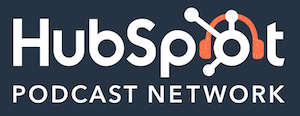
HubSpot Podcast Network is the audio destination for business professionals who seek the best education and inspiration on how to grow a business.


